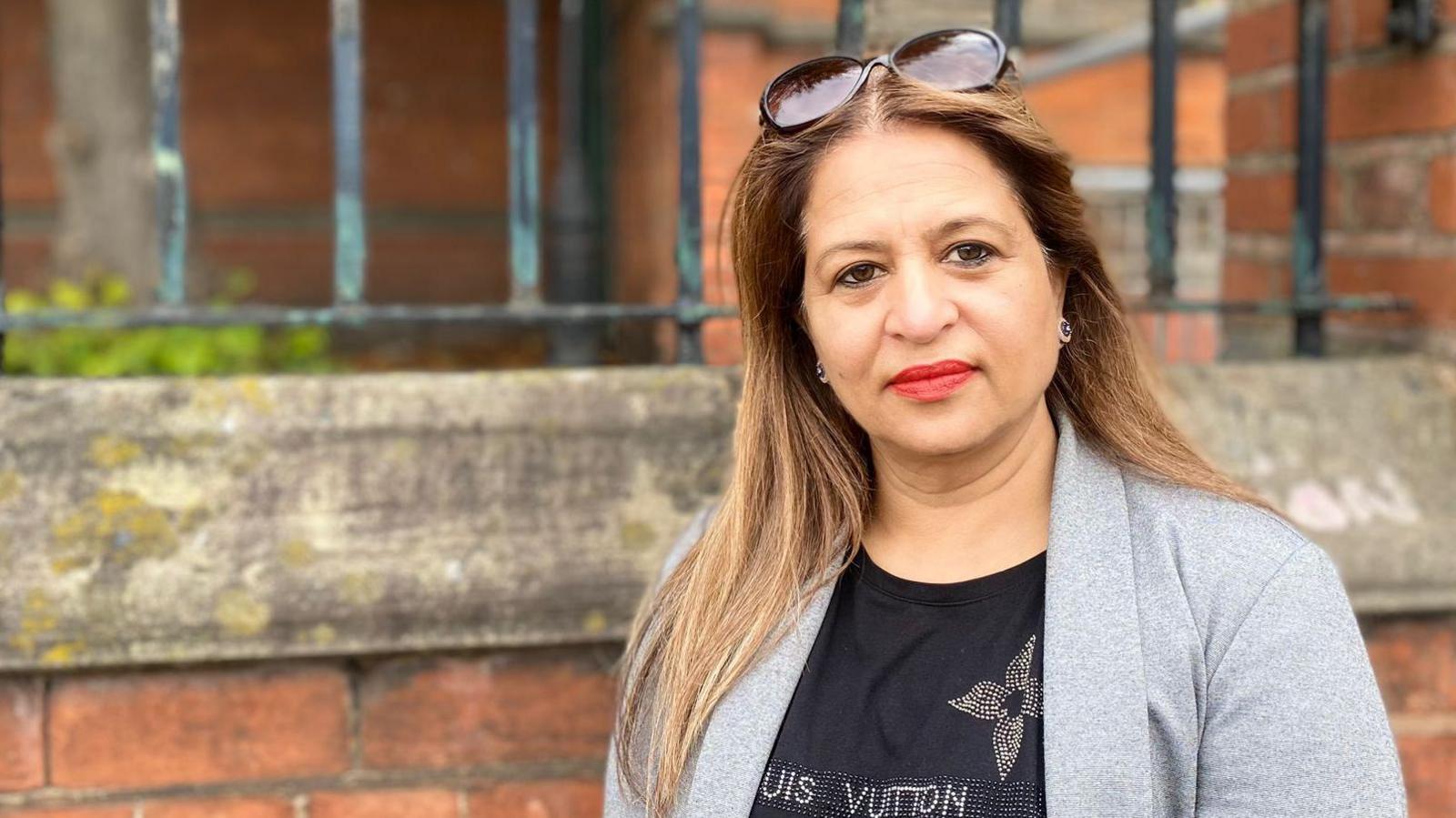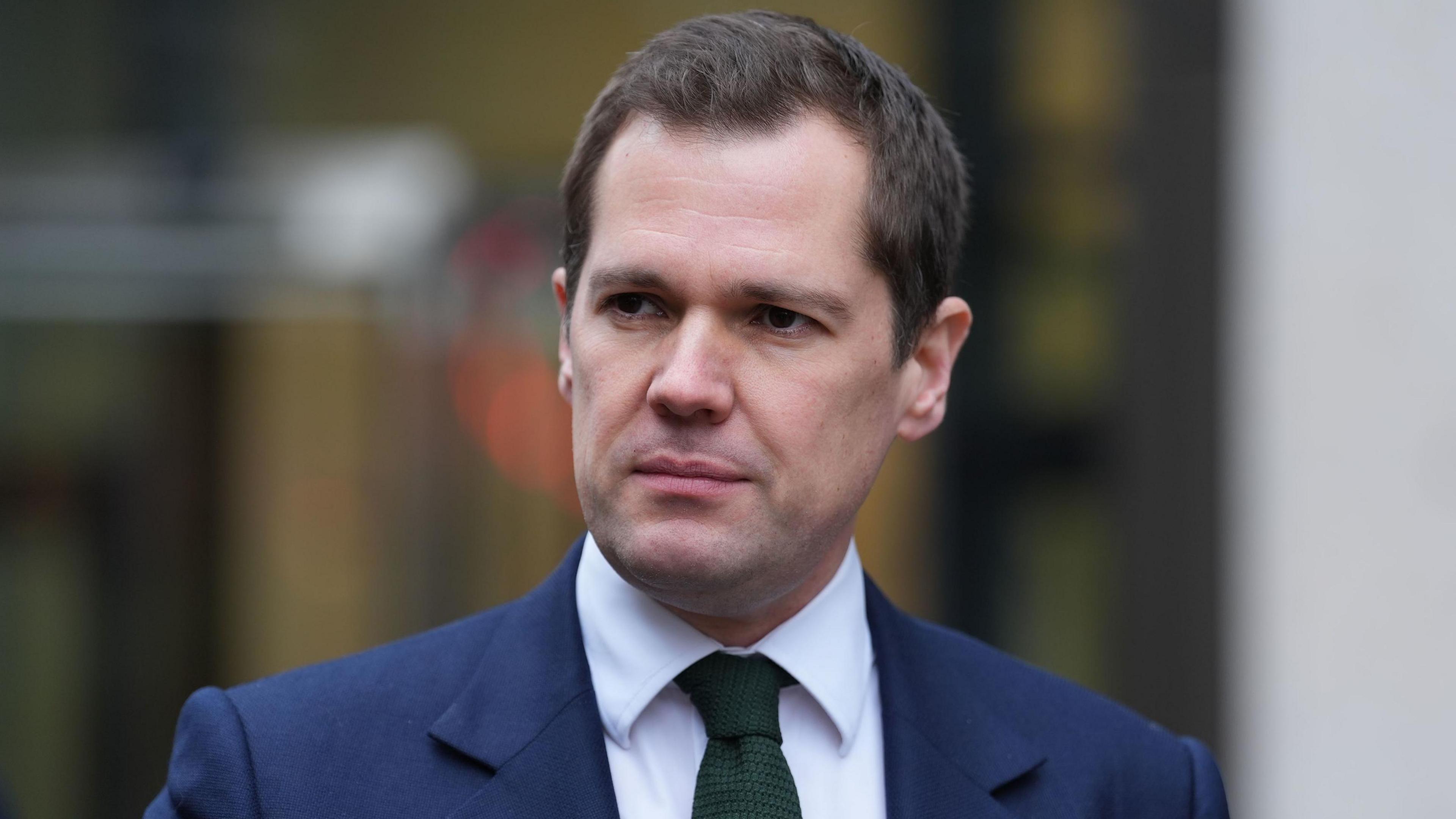Feeding toxic nationalism or fair comment? Brummies respond to Robert Jenrick
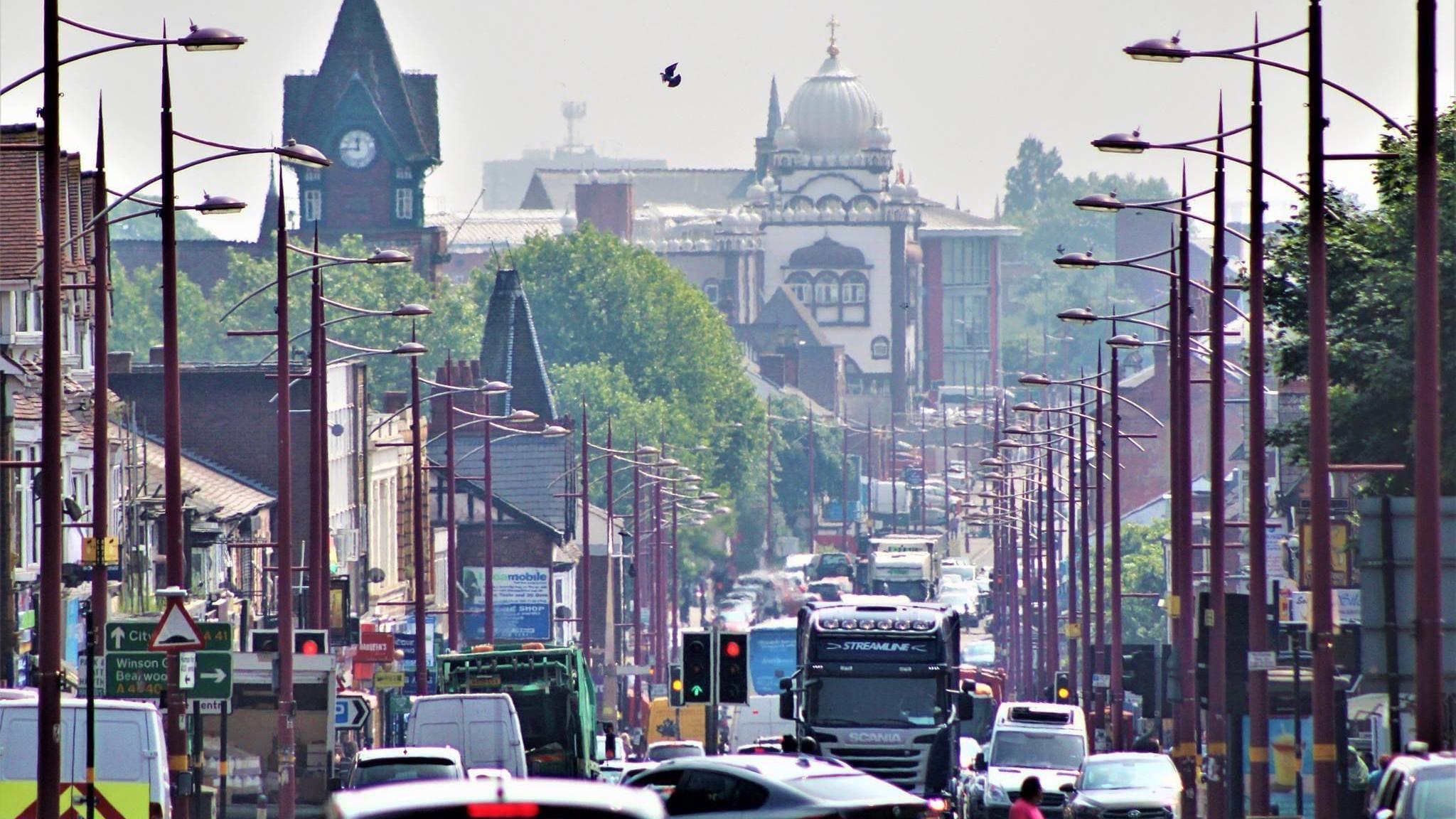
The busy Soho Road runs through the centre of Handsworth, in Birmingham
- Published
Three miles of glittering lights should have been illuminating Handsworth's Soho Road this weekend, with 20,000 people expected for the annual Diwali celebrations.
Instead, organisers have been left scrambling to organise a muted switch-on, with Sunday's event cancelled following advice from its safety advisory group, amid nationwide security concerns in the wake of the Manchester synagogue attack.
At the offices of the Soho Road Business Independent District (BID), Rakesh Soni has just got off the phone to a coach firm that was due to bring a bus load of older women from Telford in Shropshire.
"It's such a shame," he says. "People come from all over the country and from all communities – Jamaican, white, Vietnamese, Polish, Kurdish.
"There are 26 different cuisines on Soho Road and it's so friendly, everyone looks out for one another – if that doesn't say integration then I don't know what does."
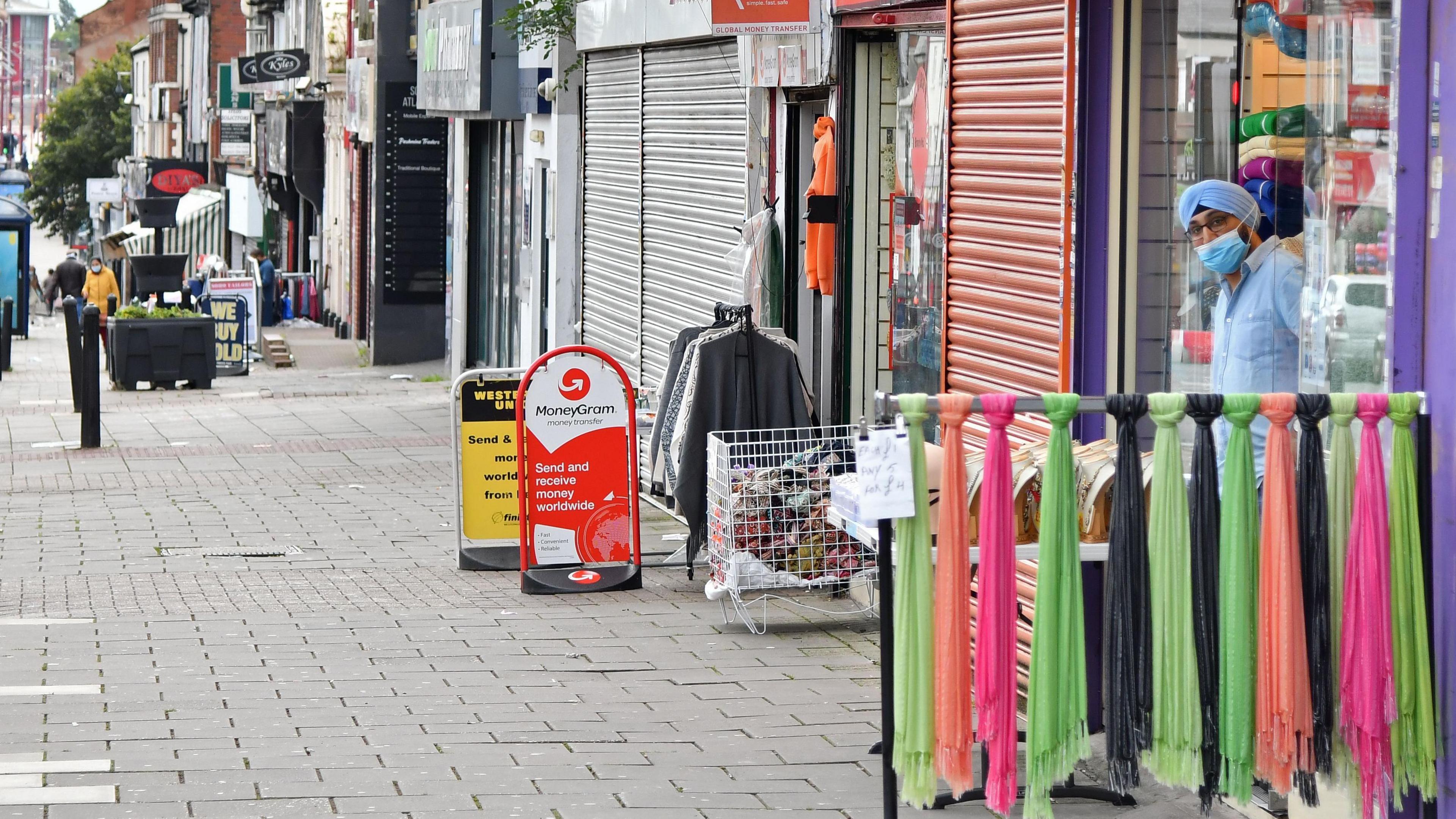
Many have leapt to Handsworth's defence this week after Robert Jenrick said it was "as close as I've come to a slum in this country"
He's referring to Conservative MP Robert Jenrick's recorded comments, made at an event earlier this year and published by the Guardian, that Handsworth was "one of the worst integrated places I've ever been to", and "as close as I've come to a slum in this country".
Jenrick also said he had spent an hour-and-a-half there and not seen "another white face" during his visit, adding: "It's not about the colour of your skin or your faith, of course it isn't. But I want people to be living alongside each other, not parallel lives."
The MP was in Handsworth to make a video about litter, a problem plaguing much of the city as it enters the tenth month of its long, acrimonious bin strike.
'Toxic nationalism'
His comment about race has been heavily criticised. Those who know Birmingham will find the observation unsurprising - even the many deeply offended by his choice of words.
The 2021 Census found 91.3% of Handsworth's population were from black, Asian and ethnic minorities (BAME).
It's significantly higher than Birmingham as a whole, which is 51.4% BAME and 48.6% white. Across England and Wales, it is 18% BAME and 82% white.
But Handsworth's demographic is not unique. Small Heath, Alum Rock and Sparkhill are among Birmingham neighbourhoods where the population is more than 75% Asian and British Asian.
For generations, the city has prided itself on its multiculturalism.
Jenrick's comments have angered many politicians, rights groups and locals.
The Bishop of Birmingham Michael Volland said he felt they "had the potential to generate anxiety and stir up division" and "feed into a harmful narrative that provides fuel for a fire of toxic nationalism".
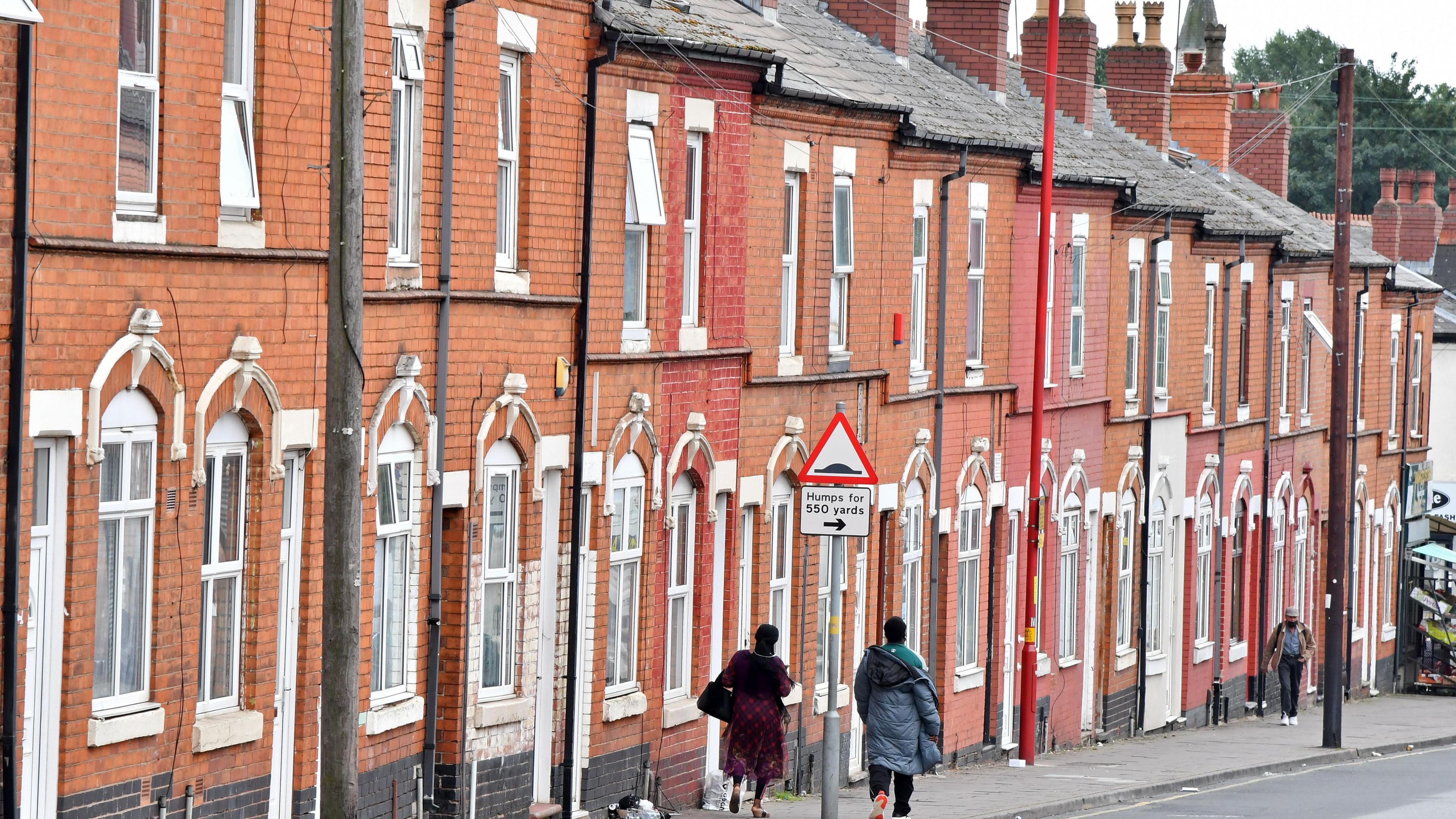
Others say they agree with the Conservative MP's comments about the Birmingham neighbourhood
Since a wave of mass immigration in the 1960s, Handsworth has been a place that has welcomed many new communities.
It is just three miles away from Smethwick where, in 1965 and days before his assassination, Malcolm X visited to witness first-hand the racial discrimination being endured by black and Asian families.
Twenty years later, simmering racial tensions and police mistrust escalated into the Handsworth riots, with shops looted, cars burned and 35 people injured or hospitalised over two days of mayhem. Two people lost their lives.
'Brilliant civil society'
Former West Midlands mayor Andy Street said this week the area had come "a hell of a long way" since then.
"If you go along the main streets there you will see Sikhs, Hindus, Muslims, Christians, a lot of them of African and Caribbean extract and of course, origin.
"And of course white people as well. It is actually one of the most successfully integrated places.
"Brilliant civil society, brilliant faith leadership."
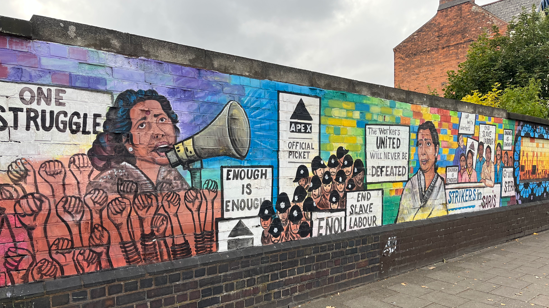
Colourful murals cite battles the area has overcome
There are few empty shops on Soho Road – it has the opposite problem, Rakesh from the BID says, with businesses clamouring to share the same street as some of the country's finest Asian jewellery shops.
It's noisy, busy and often filled with cars, bumper to bumper. It's also a kaleidoscope of colours from vibrant historical murals to intricate sarees in shop windows.
But a number of traders and residents told the BBC they were concerned about increasing antisocial behaviour, including drug-dealing, street drinking and prostitution at all times of the day.
For them, elements of Jenrick's slum comments ring true.
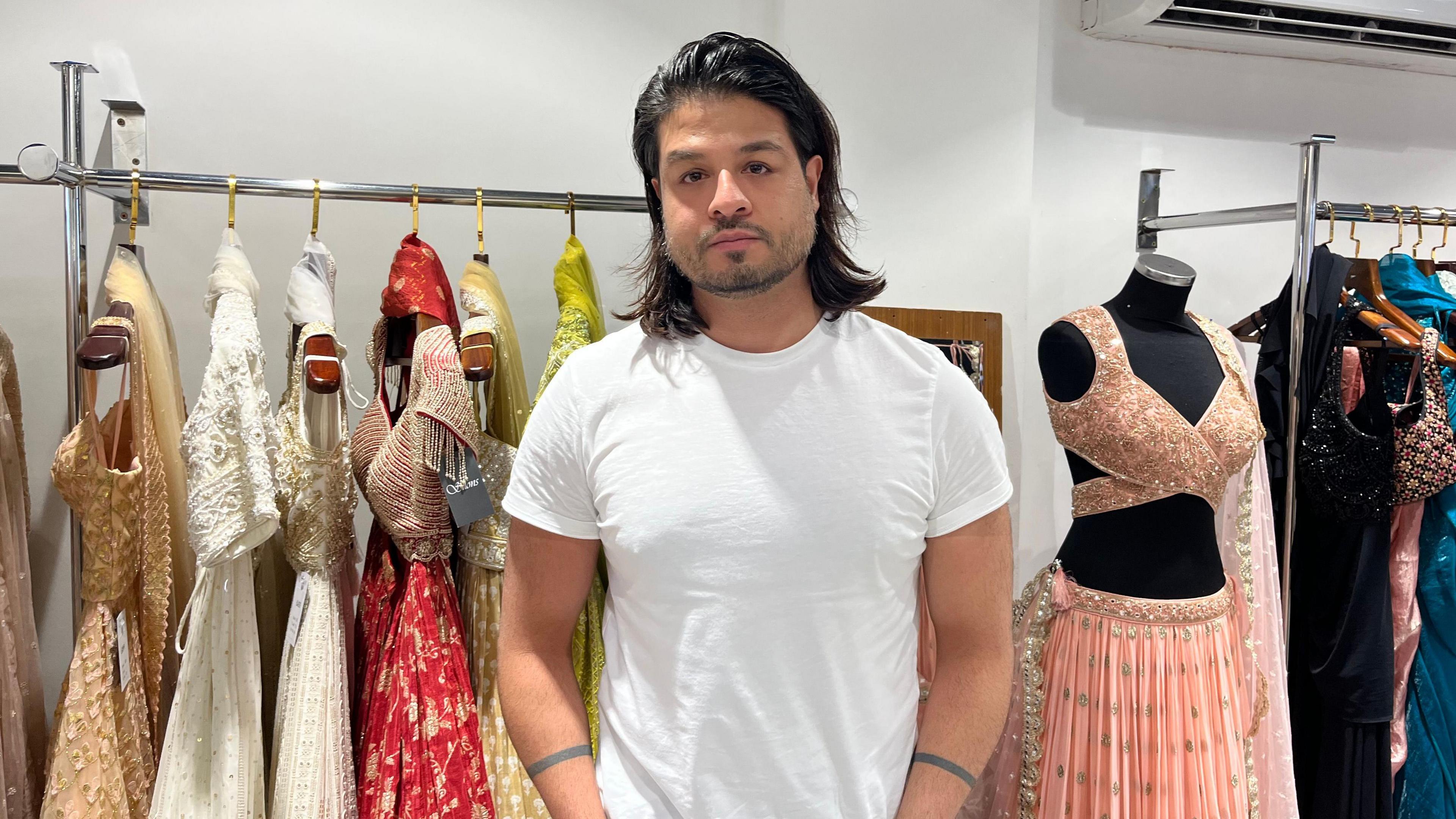
Rishi Davda runs Silons on the Soho Road and grew up in the area
Rishi Davda, 36, grew up at his family's newsagent down the road after his parents came to Handsworth in the 1970s.
"People are dealing drugs openly, there's prostitution openly and pimps.
"It's just lawlessness, absolute lawlessness.
"My parents made a big effort to integrate and be part of the local community and the community fabric, whereas now I totally agree people on the whole don't seem to want to integrate."
Jas Kaur, from India, has lived in Handsworth for 23 years. She said she'd noticed a decline over the past couple of years.
"The biggest issue is junkies and drugs being taken on the streets. If they could clean up the mess, it would be great.
"Families and kids, especially ladies, walking down the road, they don't feel safe."
'Modern fabric of Birmingham'
Historian Kieran Connell grew up a few miles away in Balsall Heath, another predominantly south Asian suburb of Birmingham. His friends were from India, Pakistan, Yemen and the Caribbean.
"My experience at school was in some ways the nightmare vision for someone like Robert Jenrick, where a white kid is by himself in a class of people from south Asian or black or other backgrounds. But I think it was an incredible, enriching and powerful experience for me," he says.
"I see cultural difference increasingly as part of what it means to be British. It's a part of the modern fabric of Birmingham."
Handsworth and other inner city areas have been worst affected in recent years by a lack of investment, Mr Connell says, "disproportionately hitting the areas which already had problems around poverty and housing stock".
"Jenrick's partly to blame for that because of the choices made around austerity [more than a decade after] the 2008 financial crash and we've been living through a period of relative under-investment and austerity policies, especially around housing and community funding."
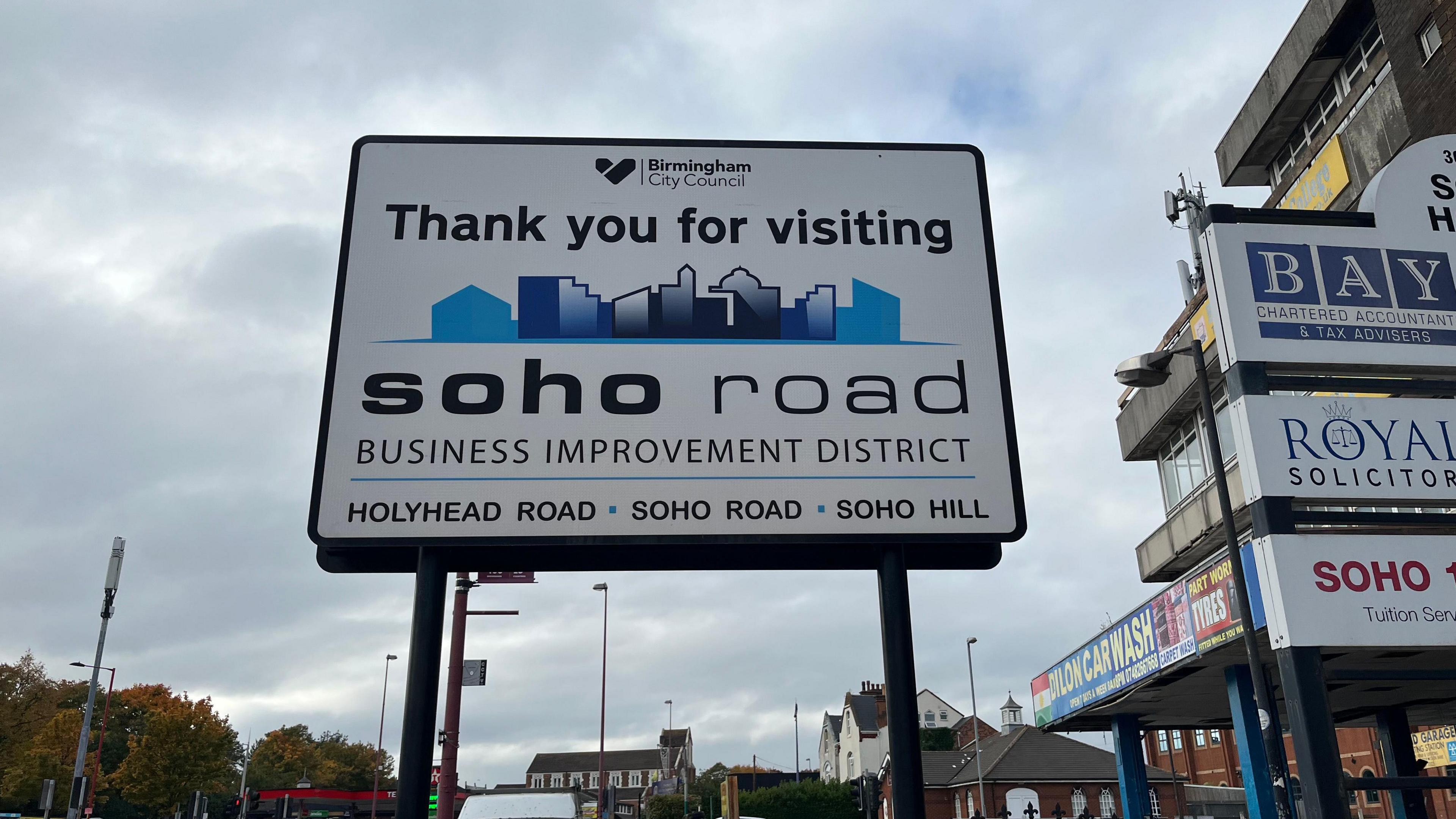
The Business Improvement District is responsible for helping the neighbourhood
Brummies are used to a brutal soundbite.
It's 10 years ago since broadcasting regulator Ofcom found Fox News in breach of the broadcasting code after one of its contributors called Birmingham a "no-go zone" for non-Muslims.
And a year ago, people leapt to the defence of Sparkhill after Conservative MP Paul Scully used the same description during interviews. Unlike Jenrick, he apologised.
Journalists often lap up these headline-grabbing moments, with no shortage of people across Birmingham willing to stand up for their beloved city and community.
But there are plenty more who see eye-to-eye with the opinions of Jenrick and Scully.
Facebook is filled with comments agreeing with the lack of integration in parts of the city.
"People in a lot of these areas can go a lifetime never speaking English," one poster says.
"I was born and raised in Handsworth. I would not not choose to return. All [Jenrick] is saying is truth and an opinion," another adds.
Talking to the BBC earlier this week, a man called Dave said different communities in Handsworth kept themselves to themselves, while fellow local Amarjit Singh said the area lacked "togetherness".
Tory leader Kemi Badenoch said she was worried about "Birmingham as a whole".
"In fact, I'm quite worried about these sectarian MPs who've been elected in Birmingham, very, very divisive politics, people who are more interested in talking about Gaza than what's happening in the UK," she went on.
Harassment and intimidation
Last year's general election saw unprecedented scenes at counts across the city.
In a shock win, pro-Palestine independent candidate for the Perry Barr district, Ayoub Khan, ousted Labour's longstanding MP Khalid Mahmood by 507 votes.
Two other prominent Birmingham Labour MPs faced close competition in their constituencies from candidates who campaigned on pro-Gaza tickets.
As she narrowly retained her Yardley seat, Jess Phillips faced jeers when giving her victory speech and said it had been "the worst election I've ever stood in" with threats and intimidation levelled at her throughout.
Now-Home Secretary Shabana Mahmood experienced similar hostility despite holding the Ladywood constituency, describing it as a campaign "sullied by harassment and intimidation" of her, her family and supporters.
But amid Birmingham's political tensions and the challenges many parts of the city face, billions of pounds are being invested.
There is a feelgood sense for many about its future. A report this week said more than 100 million people visited the West Midlands last year - a new record.
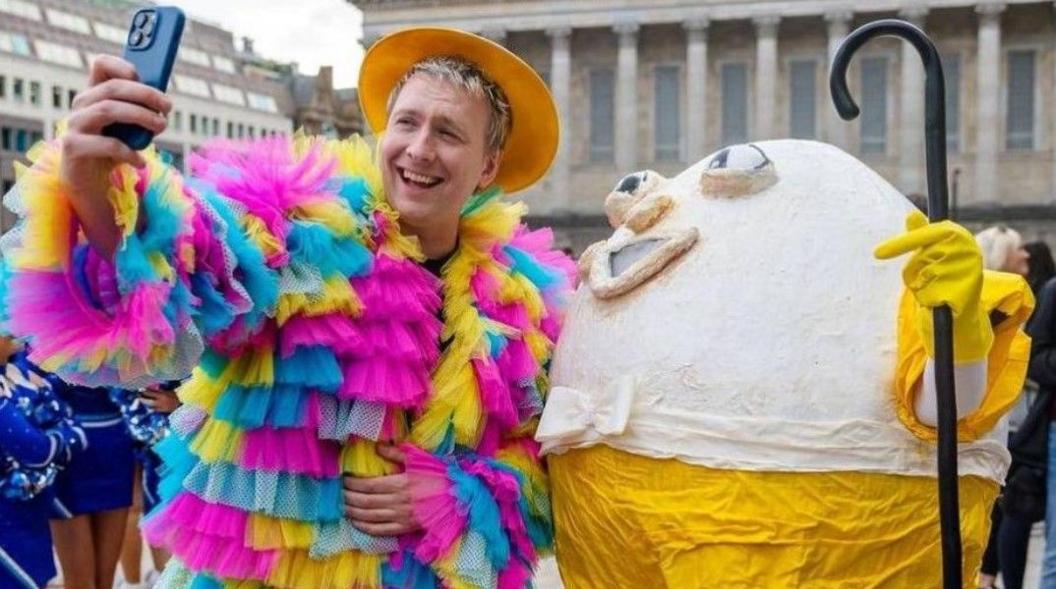
Joe Lycett with Mr Egg, a Birmingham icon named after a legendary takeaway
Two weeks ago, a flamboyantly-dressed Joe Lycett stood on the balcony of Birmingham City Council House, waving at a crowd of several hundred Brummies who turned out for his second annual International Day of Birmingham.
The comedian, who still lives in the city, waved like royalty at the joyful mass in Victoria Square as the "United States of Birmingham" flag was unfurled.
"A flag we can all be proud of, a flag that symbolises unity, kindness, being the underdog, not having our bins emptied, and above all else, friendship."
Few have done more to raise the profile of the city in recent years than Lycett, whose pride for his home city shines as bright as his exuberant outfits.
There are many who share his vision of Birmingham. But as the fallout after Jenrick's comments showed, there are plenty who see the city significantly more divided.
Get in touch
Tell us which stories we should cover in Birmingham and the Black Country
Follow BBC Birmingham on BBC Sounds, Facebook, external, X, external and Instagram, external.
Related topics
- Published10 October
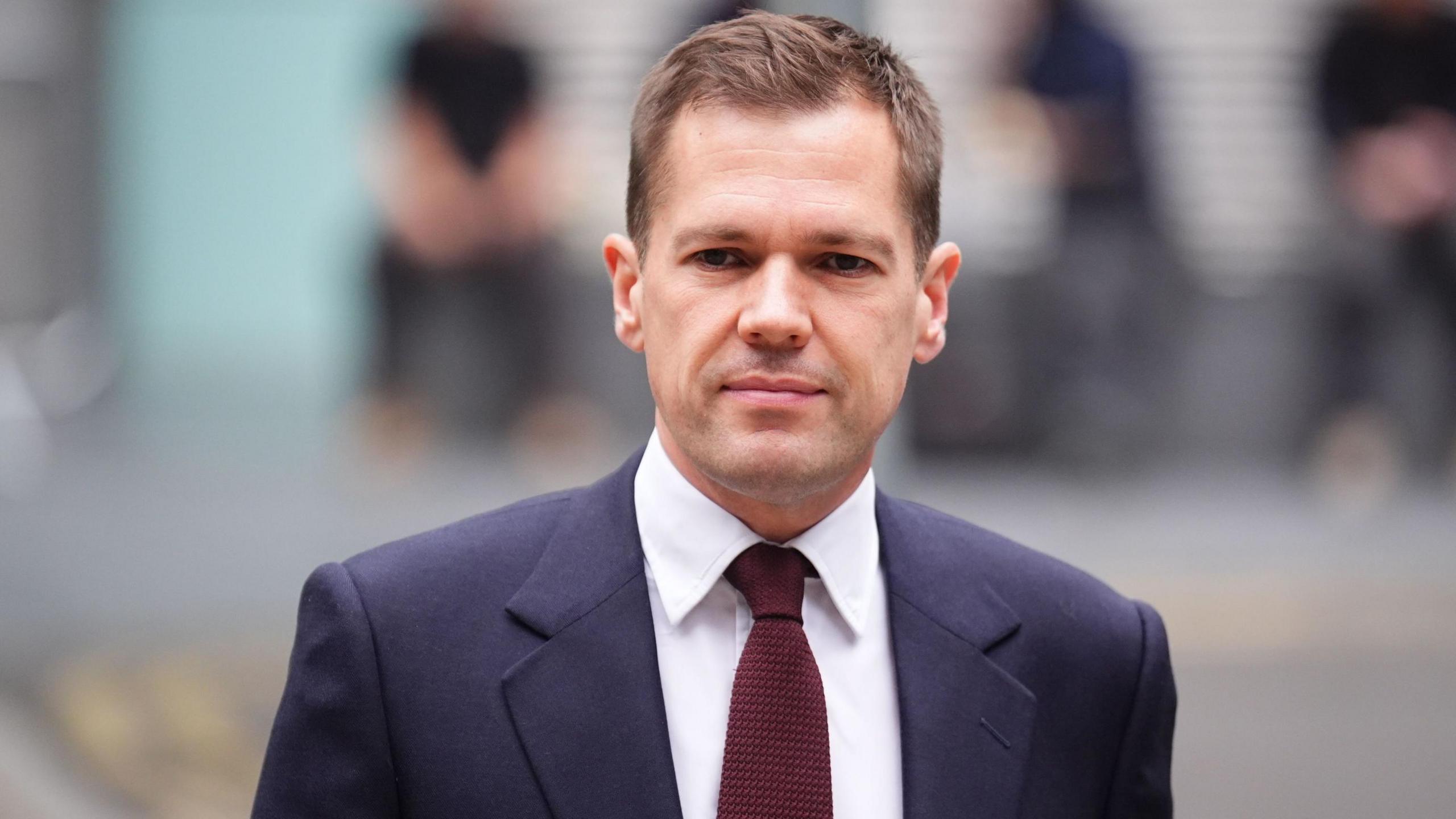
- Published8 October
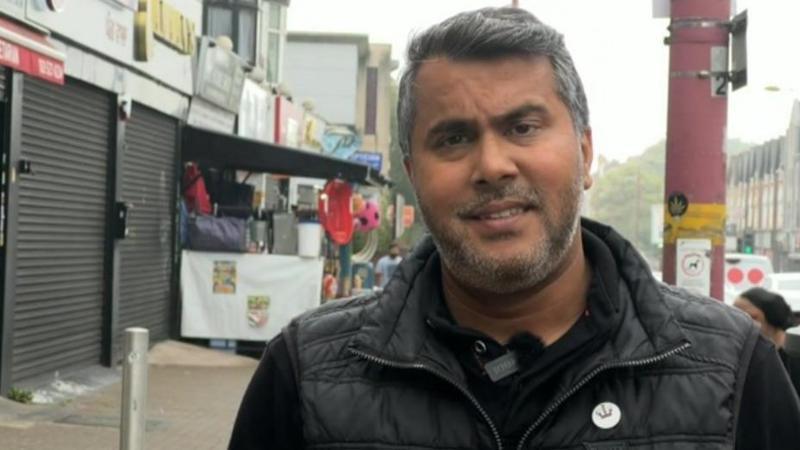
- Published7 October
